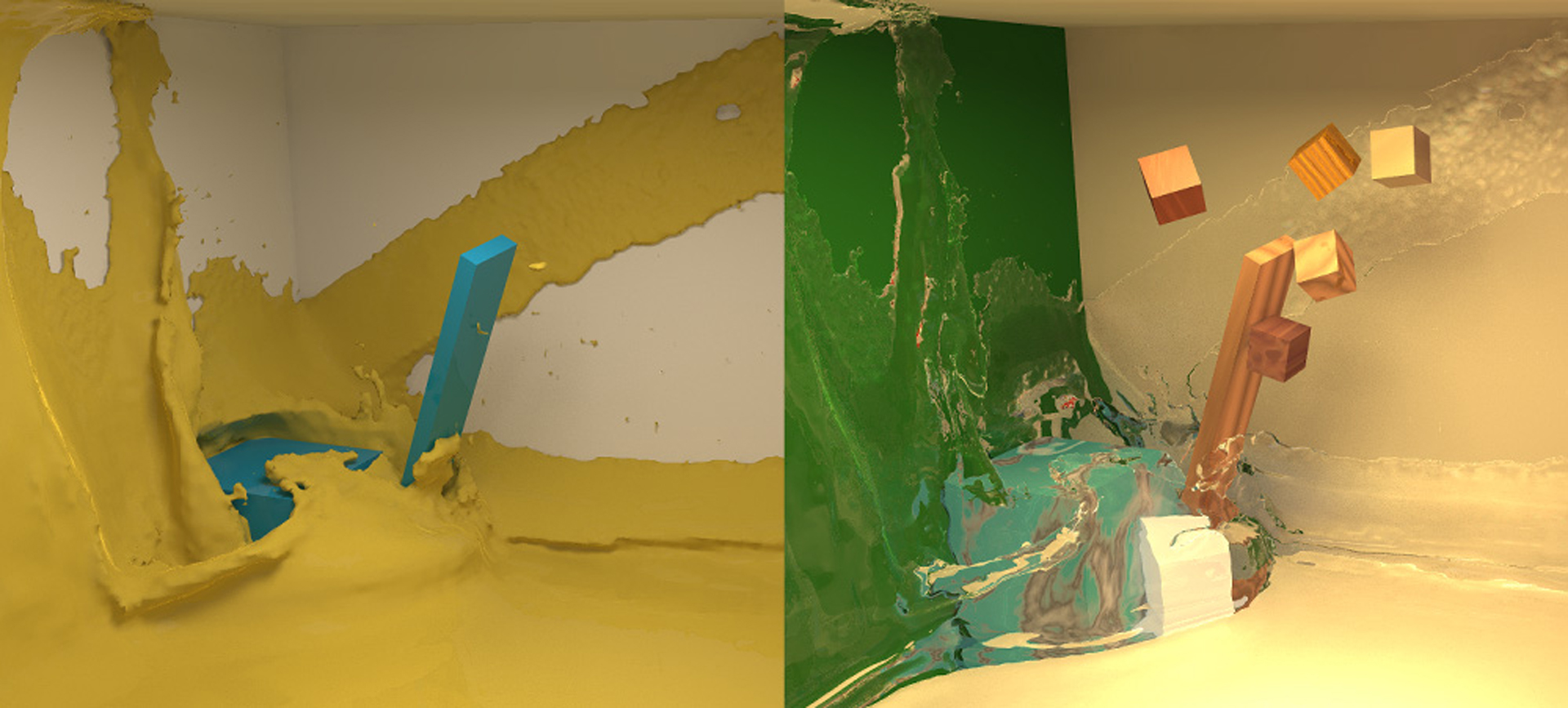“Rigid fluid: animating the interplay between rigid bodies and fluid” by Carlson, Mucha and Turk
Conference:
Type(s):
Title:
- Rigid fluid: animating the interplay between rigid bodies and fluid
Presenter(s)/Author(s):
Abstract:
We present the Rigid Fluid method, a technique for animating the interplay between rigid bodies and viscous incompressible fluid with free surfaces. We use distributed Lagrange multipliers to ensure two-way coupling that generates realistic motion for both the solid objects and the fluid as they interact with one another. We call our method the rigid fluid method because the simulator treats the rigid objects as if they were made of fluid. The rigidity of such an object is maintained by identifying the region of the velocity field that is inside the object and constraining those velocities to be rigid body motion. The rigid fluid method is straightforward to implement, incurs very little computational overhead, and can be added as a bridge between current fluid simulators and rigid body solvers. Many solid objects of different densities (e.g., wood or lead) can be combined in the same animation.
References:
1. CARLSON, M., MUCHA, P. J., VAN HORN, III, R. B., AND TURK, G. 2002. Melting and flowing. In ACM SIGGRAPH Symposium on Computer Animation, 167–174. Google ScholarDigital Library
2. CARLSON, M. T. 2004. Rigid, Melting, and Flowing Fluid. PhD thesis, Georgia Institute of Technology. Google ScholarDigital Library
3. CHEN, J. X., ANDDA VITORIA LOBO, N. 1995. Toward interactive-rate simulation of fluids with moving obstacles using Navier-Stokes equations. Graphical Models and Image Processing 57, 2, 107–116. Google ScholarDigital Library
4. ENRIGHT, D., FEDKIW, R., FERZIGER, J., AND MITCHELL, I. 2002. A hybrid particle level set method for improved interface capturing. Journal of Computational Physics 183, 83–116. Google ScholarDigital Library
5. ENRIGHT, D. P., MARSCHNER, S. R., AND FEDKIW, R. P. 2002. Animation and rendering of complex water surfaces. ACM Transactions on Graphics 22, 3, 736–744. Google ScholarDigital Library
6. FEDKIW, R., STAM, J., AND JENSEN, H. W. 2001. Visual simulation of smoke. In Proceedings of ACM SIGGRAPH 2001, Computer Graphics Proceedings, Annual Conference Series, 15–22. Google ScholarDigital Library
7. FEDKIW, R. P. 2002. Coupling an Eulerian fluid calculation to a Lagrangian solid calculation with the ghost fluid method. Journal of Computational Physics 175, 200–224. Google ScholarDigital Library
8. FOSTER, N., AND FEDKIW, R. 2001. Practical animation of liquids. In Proceedings of ACM SIGGRAPH 2001, Computer Graphics Proceedings, Annual Conference Series, 23–30. Google ScholarDigital Library
9. FOSTER, N., AND METAXAS, D. 1996. Realistic animation of liquids. Graphical Models and Image Processing 58, 5, 471–483. Google ScholarDigital Library
10. FOSTER, N., AND METAXAS, D. 1997. Controlling fluid animation. In Proceedings CGI ’97, 178–188. Google ScholarDigital Library
11. GÉNEVAUX, O., HABIBI, A., AND DISCHLER, J.-M. 2003. Simulating fluid-solid interaction. In Graphics Interface, CIPS, Canadian Human-Computer Communication Society, 31–38.Google Scholar
12. GLOWINSKI, R., PAN, T.-W., HESLA, T. I., AND JOSEPH, D. D. 1999. A distributed Lagrange multiplier/fictious domain method for particulate flows. International Journal of Multiphase Flow 25, 5, 755–794.Google ScholarCross Ref
13. GUENDELMAN, E., BRIDSON, R., AND FEDKIW, R. P. 2003. Nonconvex rigid bodies with stacking. ACM Transactions on Graphics 22, 3, 871–878. Google ScholarDigital Library
14. HIRT, C., AMSDEN, A., AND COOK, J. 1974. An arbitrary Lagrangian-Eulerian computing method for all flow speeds. Journal of Computational Physics 14, 227–253.Google ScholarCross Ref
15. O’BRIEN, J. F., ZORDAN, V. B., AND HODGINS, J. K. 2000. Combining active and passive simulations for secondary motion. IEEE Computer Graphics and Applications 20, 4, 86–96. Google ScholarDigital Library
16. OSHER, S., AND FEDKIW, R. P. 2003. Level Set Methods and Dynamic Implicit Surfaces. No. 153 in Applied Mathematical Sciences. Springer-Verlag, New York.Google Scholar
17. PATANKAR, N. A., SINGH, P., JOSEPH, D. D., GLOWINSKI, R., AND PAN, T.-W. 2000. A new formulation of the distributed Lagrange multiplier/fictious domain method for particulate flows. International Journal of Multiphase Flow 26, 9, 1509–1524.Google ScholarCross Ref
18. PATANKAR, N. A. 2001. A formulation for fast computations of rigid particulate flows. Center for Turbulence Research Annual Research Briefs 2001, 185–196.Google Scholar
19. PESKIN, C. S. 2002. The immersed boundary method. Acta Numerica 11, 479–517.Google ScholarCross Ref
20. SINGH, P., HESLA, T. I., AND JOSEPH, D. D. 2003. Distributed Lagrange multiplier method for particulate flows with collisions. International Journal of Multiphase Flow 29, 3, 495–509.Google ScholarCross Ref
21. STAM, J. 1999. Stable fluids. In Proceedings of SIGGRAPH 99, Computer Graphics Proceedings, Annual Conference Series, 121–128. Google ScholarDigital Library
22. TAKAHASHI, T., HEIHACHI, U., AND KUNIMATSU, A. 2002. The simulation of fluid-rigid body interaction. In SIGGRAPH 2002: Sketches & Applications, 266. Google ScholarDigital Library
23. TAKAHASHI, T., FUJII, H., KUNIMATSU, A., HIWADA, K., SAITO, T., TANAKA, K., AND UEKI, H. 2003. Realistic animation of fluid with splash and foam. Computer Graphics Forum 22, 3, 391–401.Google ScholarCross Ref
24. WEIMER, H., AND WARREN, J. 1999. Subdivision schemes for fluid flow. In Proceedings of SIGGRAPH 99, Computer Graphics Proceedings, Annual Conference Series, 111–120. Google ScholarDigital Library
25. WITTING, P. 1999. Computational fluid dynamics in a traditional animation environment. In Proceedings of SIGGRAPH 99, Computer Graphics Proceedings, Annual Conference Series, 129–136. Google ScholarDigital Library
26. WOOTEN, W. L., AND HODGINS, J. K. 1996. Animation of human diving. Computer Graphics Forum 15, 1, 3–14.Google ScholarCross Ref
27. WRENNINGE, M. 2003. Fluid Simulation for Visual Effects. Master’s thesis, Linköpings Universitet, Linköping, Sweden.Google Scholar
28. YNGVE, G. D., O’BRIEN, J. F., AND HODGINS, J. K. 2000. Animating explosions. In Proceedings of SIGGRAPH 2000, Computer Graphics Proceedings, Annual Conference Series, 29–36. Google ScholarDigital Library





